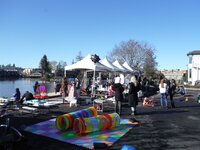Fascinating topic. I think about that stuff all the time-- like, our house was built in 1962 and we bought it in 1997. We may reach the point where we are the people who lived in it the longest-- that is true of the apartment in New York where I grew up, where mom lived for over half a century. Sometimes I'll wonder, was I the first person to drop acid in this house? (Scary I was still doing that when I moved here!)
I remember when the trails I ride were actual roads. I moved to L.A. in 1991, so I did drive Mt. Hollywood and Vista Del Valle drive a few times before they were closed-- thankfully, though I didn't think so at the time-- to auto traffic. But what were those roads like after they were built? And I can't find out anything about Brand Park Motorway's origins. Did cars ever drive up that?! What were these neighborhood like? The view from Mt. Verdugo?
And yes, I do think about the guy who built the house, the roads, what their lives were like, too. One fascinating bit of trivia: My cousin transferred some old 16mm footage from the early 1930s-- Grandpa was a film buff. And he did crazy things, too-- like just set the camera on a tripod in Rockefeller Center and film people walking down the street! The footage is SO amazing. (My dad and my aunt playing in a crib!)
He also filmed a lot of his business meetings, and one thing really, really struck me: People were so happy! Okay, they always transfer 16mm at the wrong speed, so everyone's moving faster and seems really animated. And I'm sure he was filming important occasions-- openings of a new laboratory or company division. But I cannot believe the smiles on peoples in faces-- constantly-- as they are walking around in suits. You see it in the field, too-- he worked in communications, and filmed guys putting up these towers with antennas. Their
attitude is relentlessly upbeat in a way that's hard to describe.
It was a different America-- between the wars, and after the first "big one," everyone thought we'd licked the bad guys for good. We really didn't have a sense of the damage we were doing to the air and water, or how we'd slaughtered native Americans-- there was no mass communication. It wasn't like today, when you will kind of go a bit crazy if you try to repress all that, where the deniers often have kind of a brittle hysteria. People really didn't know if no one taught them, or they couldn't find the books on the shelf, or those books weren't in the library, and had no way to find out.
And frankly, that's kind of scary to think about. How genuinely
happy people were as they were setting the stage for what's happening today. But of course that's not the whole story at all. People in Grandpa's socioeconomic group didn't work nearly as long hours as someone from the same demographic would today. Their standard of living was crazy high by today's standards. Most of the time-- except in war years, or other emergencies-- everyone came home at 5:00. The idea of working through vacations or forced overtime, those were problems for people who lived in poverty.
Above all, what it probably was? The sense that things were getting better, that the industrial age would lift everyone out of misery and suffering. It was possible at least for some people to believe that in a way that I don't think is possible now.
I was not born into a world that I was suited for. It was a world of route memorization, long division and spelling, staying between the lines. It was not a world where creativity was valued. This era is much more suited to me. I am able to do things that the people prepared, groomed and rewarded in that world can never do. A guy's bike motor disintegrated. No bike shop in two well populated and bike friendly counties would touch it. Then he found me. I had it done in three days with new parts. I also make artistic performance bikes that do not look at all electric. That job did not exist in that former world of gas guzzlers, typewriters and time cards. I haven't used an alarm clock in three years.
I've thought about this as well. I think I was generally born into the right place and time for my skill set. I think I've got two decades on you, Pedal, so I was in my 20s, and lost in my own little world, when you were a student and not really aware of what it was like for people who were younger. But I do know that my mother, who worked in learning disabilities, started being really appalled by excessive student workload and mindless busywork students were subjected to even in the 80s. So, had I been born earlier-- in the 40s-- I probably would have been miserable, and if I'd been your age, I might have had a bad stretch as well.
When I look at history, I guess I'm always struck by how wrong we've been about... well, everything. It seems like nothing we tell young people is true. Some of it, we lie deliberately, but usually we're just completely clueless. Like people telling me, "Don't be an English major! You'll never get a job!" I left college in 1980 with an English major (half of my double), right into a recession... but because my grammar was good and I could type over 80 WPM, and word processing became a critical skill I never had trouble finding a job. Ever. I basically was never completely out of work for more than a month or two here or there for 40 years. (Or when I was in college or grad school.)

